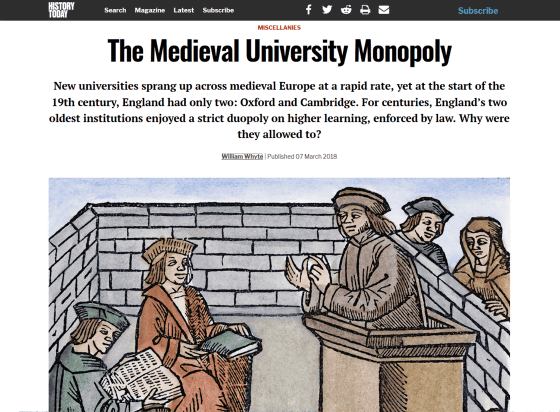Why didn't England set up universities other than Oxford and Cambridge for centuries?

by
Although many universities were established in Europe from the Middle Ages to the early modern times, in England , which accounts for two-thirds of Great Britain , only two universities , Oxford University and Cambridge University , continued until the beginning of the 19th century. .. Historian William White explains why this duopoly continued.
The Medieval University Monopoly | History Today
https://www.historytoday.com/miscellanies/medieval-university-monopoly

In 1686, a priest named
Although modern universities tend to have a calm image as a higher education institution, it was not uncommon for medieval universities to fought among students or to have conflicts with the local community. Oxford University and Cambridge University, which existed in England in the 14th century, were no exception, and there were many scholars who escaped violence and confusion and were scattered in rural areas.
However, a man who fled Oxford University in 1333 and fled to the town of Stamford in Lincolnshire in eastern England attempted to educate his students there. For Oxford University and Cambridge University, this move cannot be overlooked and sworn that 'Oxford University and Cambridge University graduates will not give lectures outside of both universities', including the then King of England, Edward III. I let it.
Known as the 'Stanford Oath,' this limitation continued until 1827, when all graduates of both universities after 1334 were required to take an oath. Morton dismissed this oath and forced him out of England, White said.

The establishment of universities has progressed rapidly in Europe since the 14th century. In the 14th century, universities were established in many
On the other hand, the establishment of the university in England progressed after the abolition of Stanford's vow in 1827. Some of the universities founded in the latter half of the 19th century were founded with the support of Oxford University and Cambridge University. What emerged here was, 'Why did both schools prevent the establishment of other universities?' 'Why did both schools succeed?' 'Why did both schools change their positions and establish a university?' Did you support?'
The simplest of these questions to answer is 'why have the two schools prevented other universities from being established?' White said. In the first place, the university was a kind of “ guild ”, and it was just a group of teachers and students who maintained the quality of students' admissions and education and negotiated with local governments. It is reasonable for the guild to monopolize the interests, and the university has been obstructing the movement of other universities to be established and its own educational system as a provider of products such as 'degree' and 'education'.

by Pablo Fernández
It is reasonable for a guild-like university to attempt a monopoly, but the main point is 'does the attempt to monopolize higher education institutions work?' In fact, Oxford University and Cambridge University have been very successful at rejecting rivals and have been able to continue to dubulate their status as England's higher education institutions for centuries.
The duopoly of higher education institutions by Oxford University and Cambridge University worked because there was a large presence that wanted to 'manage the university' as much as the university wanted to manage teachers and students. .. Mr. White points out that it was the 'church and government' that threatened the existence of the university that supported the duopoly system of both schools.
For the church, university was a dangerous entity that could create a heretic. In fact, the 14th- and 16th-century Lorardians who sought church reform evolved from the teachings of Oxford University theologian John Wycliffe , and proponents of reform such as Robert Burns and Thomas Birney also came from Cambridge University. is.
The fact that there are only two universities is convenient for the church that manages theological disputes and supervises theologians at the university, and that the church is to be established by universities other than Oxford University and Cambridge University. Did not want Therefore, the interests of both schools and the church, which wanted to prevent the establishment of other universities, were the same, and they functioned as a backing for the duopoly system.

In addition, the university is a place where political rebels could be created, and there was a risk that the overthrow of the regime would be debated and that it would be a hotbed of dissidents. The philosopher Thomas Hobbs 's book “ Behemoth (Behemoth/Behemoth) ” in 1668 also points out that Oxford University and Cambridge University were the “core of the rebels”.
Hobbes's claim may be overstated, but it's a fact that places like universities where many scholars meet and discuss are likely to cause problems, and the English government wants to keep the number of universities low. It was In this respect as well, the interests of Oxford University and Cambridge University side and the system side agreed, and the government was also cooperating to keep Stanford's oath.
The duopoly regime at Oxford and Cambridge University began to fluctuate in the 1820s, even during the period when the opposition movement was given full civil liberty and the liberation movement of Roman Catholics intensified. was. Stanford's vows were abolished in a situation where the authority of the church and system declined, and in 1828 University College London opened. Kings College London was also opened in the early 1830s to reflect the church's intentions, ending the duopoly regime of the two schools.
Then, in the 1870s, Oxford University and Cambridge University helped establish a new university, reversing the policy of the past. This is because, in addition to expanding access to higher education, it also aims to maintain the independence of the university by directing government and church oversight to other universities, and to increase the number of universities with which both schools have influence. It seems that there was also. As a result, White concludes that at the time of writing, there were over 100 universities across England.

Related Posts:
in Note, Posted by log1h_ik







